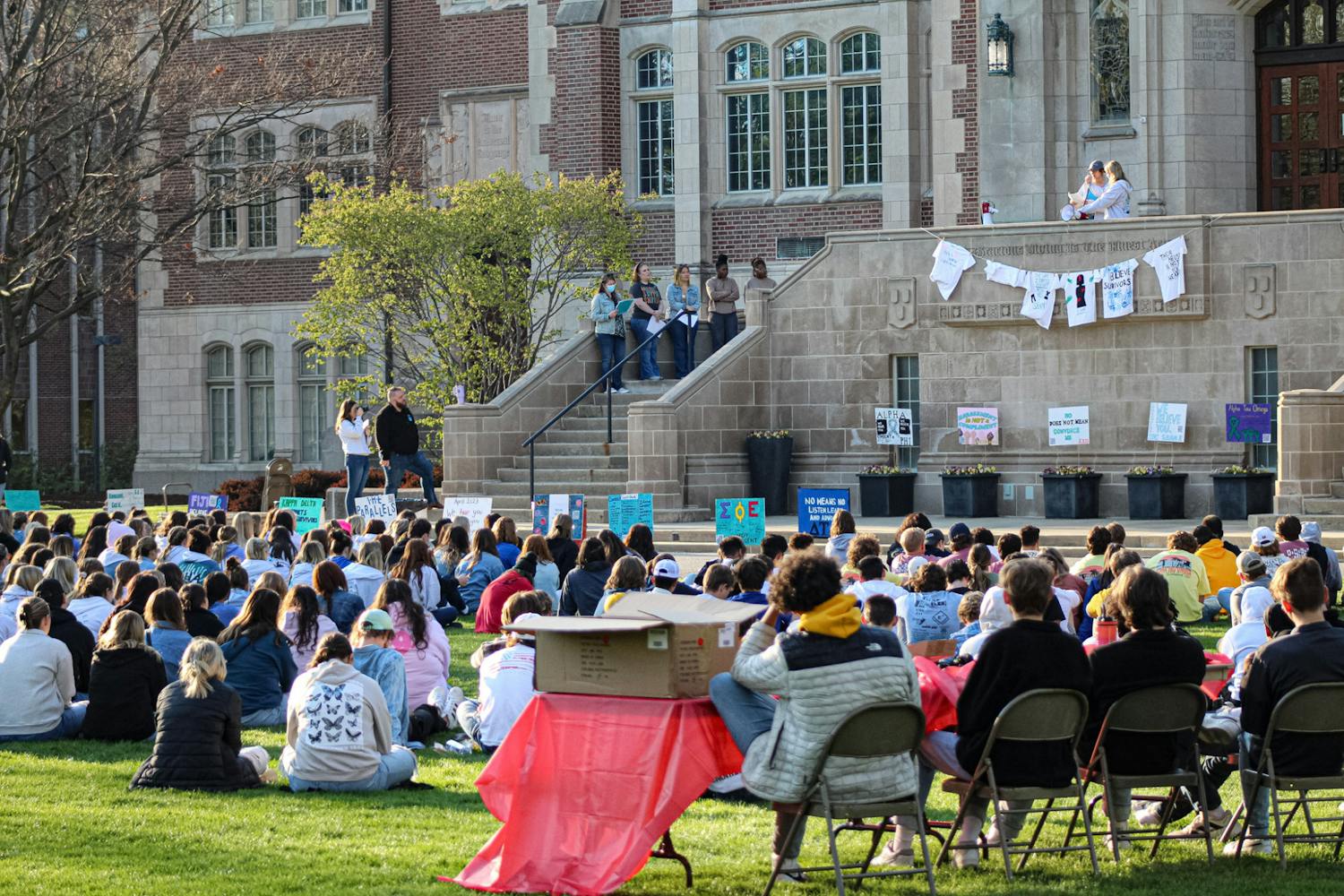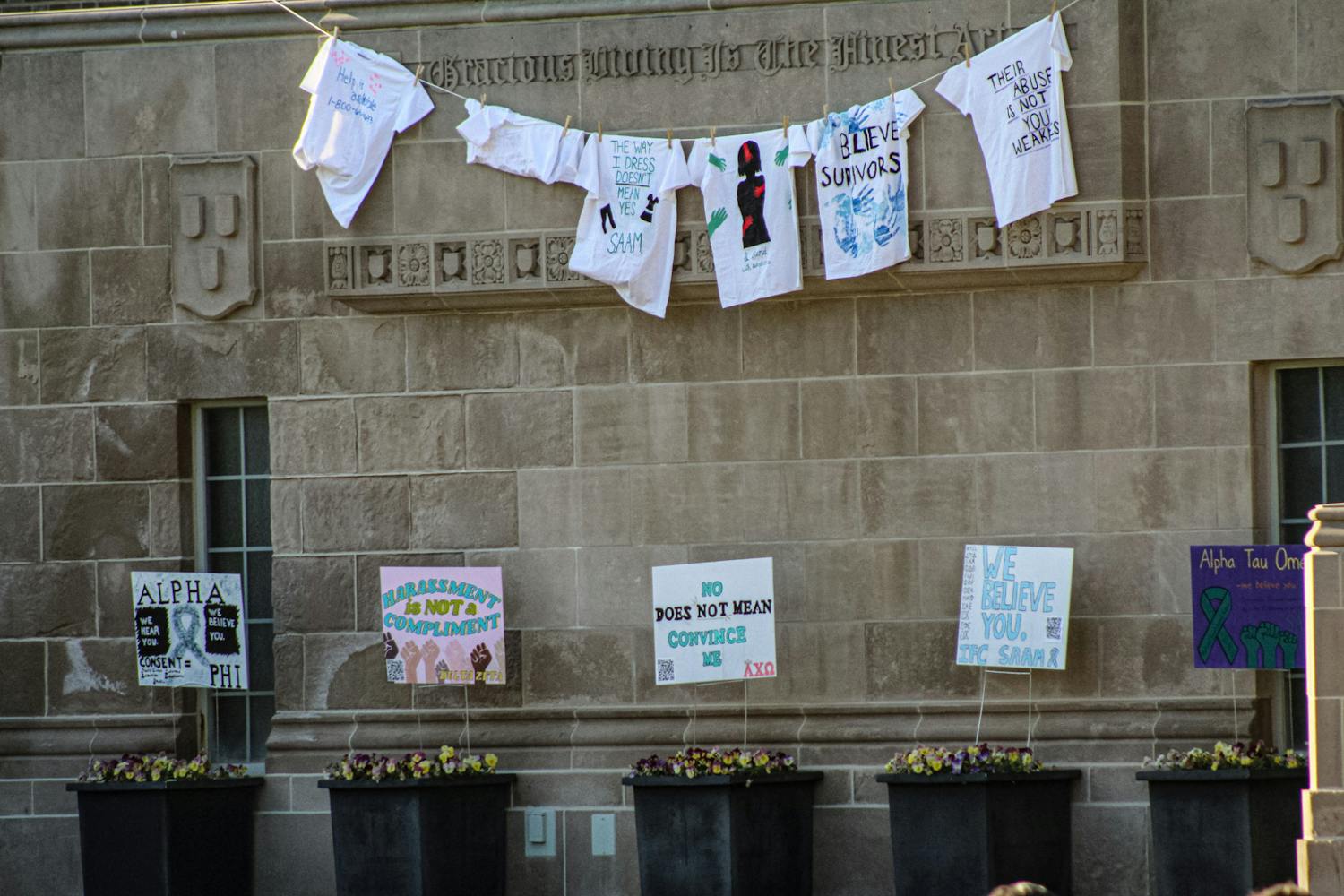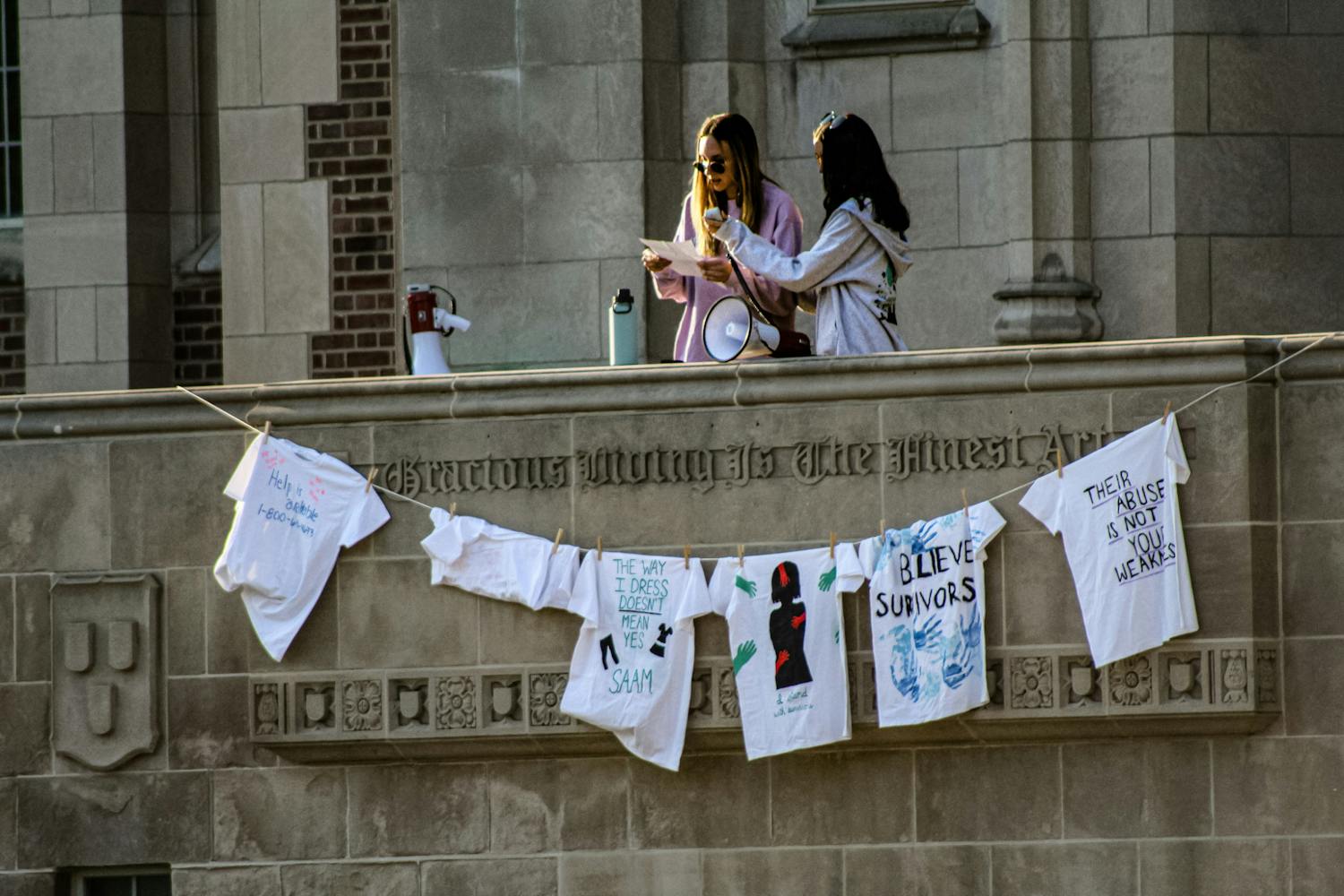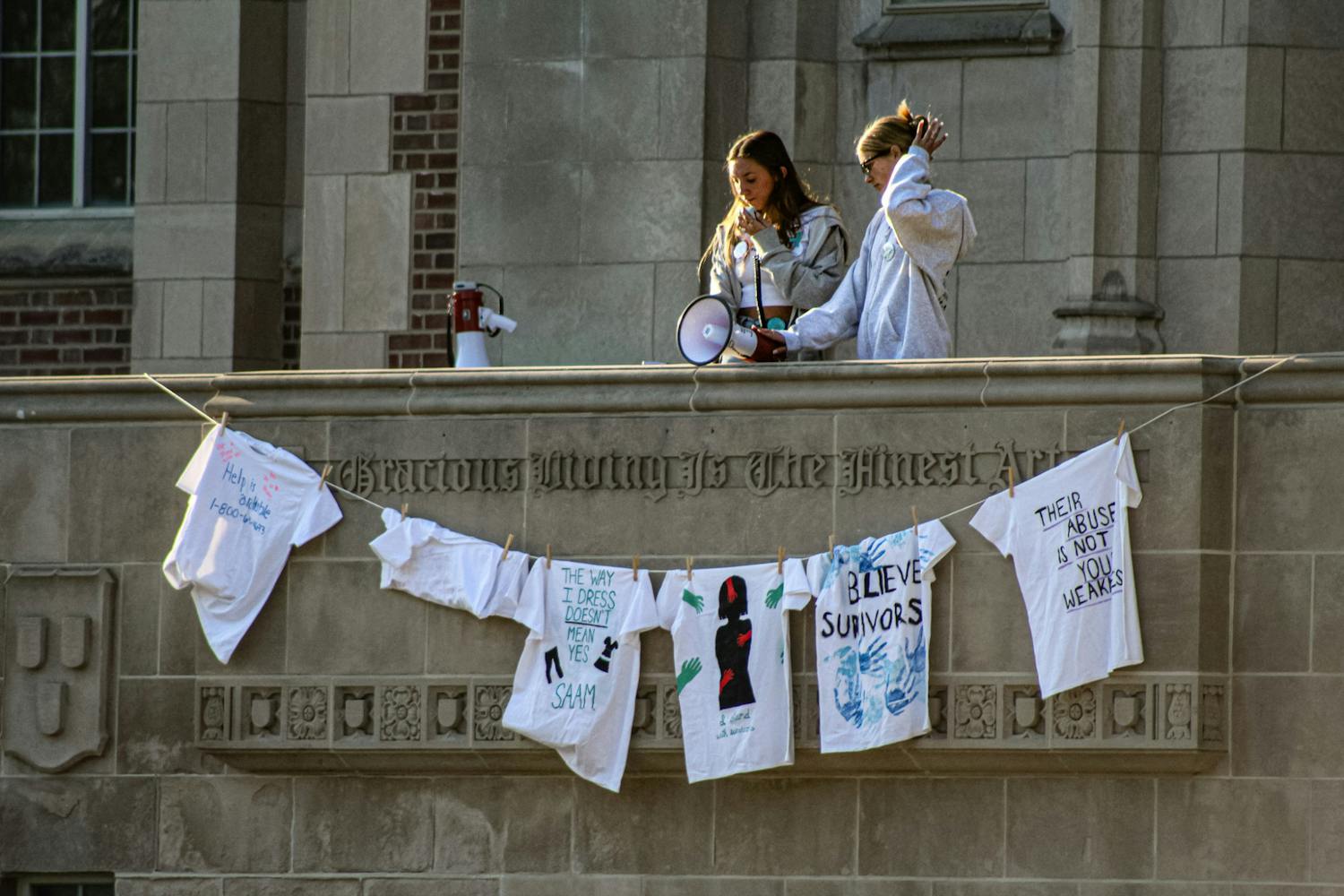During “Take Back The Night,” denim jeans don’t represent just a fashion choice, but the light for survivors impacted by sexual violence.
Ball State University hosted its annual “Take Back The Night” event April 26, taking part in a protest spanning decades to advocate for survivors of domestic violence, rape and other forms of sexual assault.
Led by Alpha Chi Omega, Fraternity & Sorority Life and the Center for Survivor Support, the event took place at the Quad on Ball State’s campus. Numerous groups across Ball State and Muncie came out and supported “Take Back The Night,” including the Counseling Center, YWCA of Muncie and the Interfraternity Council.
According to Montana State University, the event was first created in 1877 due to concerns and violence against women walking on the streets in the night. Additionally, April 26 serves as Denim Day, where individuals support sexual violence survivors after a judge overturned the sentence of a perpetrator who raped a young girl because she wore tight jeans, according to National Today.
First-year biology major Kaelyn White, who serves as the vice president of philanthropy of the Alpha Chi Omega sorority, is heavily involved in planning for “Take Back The Night,” helping spread awareness for the event.
Additionally, White helps plan numerous events relating to a philanthropy based on what she describes as healthy love, encompassing healthy relationships, healthy families, domestic violence and abuse, and sexual assault.
White and the rest of Alpha Chi Omega emphasize with women who need support in regard to sexual violence due to living in a college setting where dangerous situations could occur at any point.
“We’ve had a lot of girls struggle with getting home late at night, so normally we’ve been trying to spread more awareness for more blue lights, and more lights in different areas of the school,” White said.
Alpha Chi Omega acknowledged these threatening scenarios could occur to men and male presenting people as well. The motivation for a lot of the Alpha Chi Omega sisters to spread awareness for sexual violence comes from having personal experience or knowing someone who does.
“We focus on not victim blaming and supporting everybody we can,” White said. “We have a lot of sisters here who are survivors, or they know family members or friends [who are survivors], and that’s most of the reason why we’re here.”
The event not only had a rally march and table booths of resources providing sexual violence support but also testimonies from survivors themselves and women speaking on behalf of survivors kept anonymous.
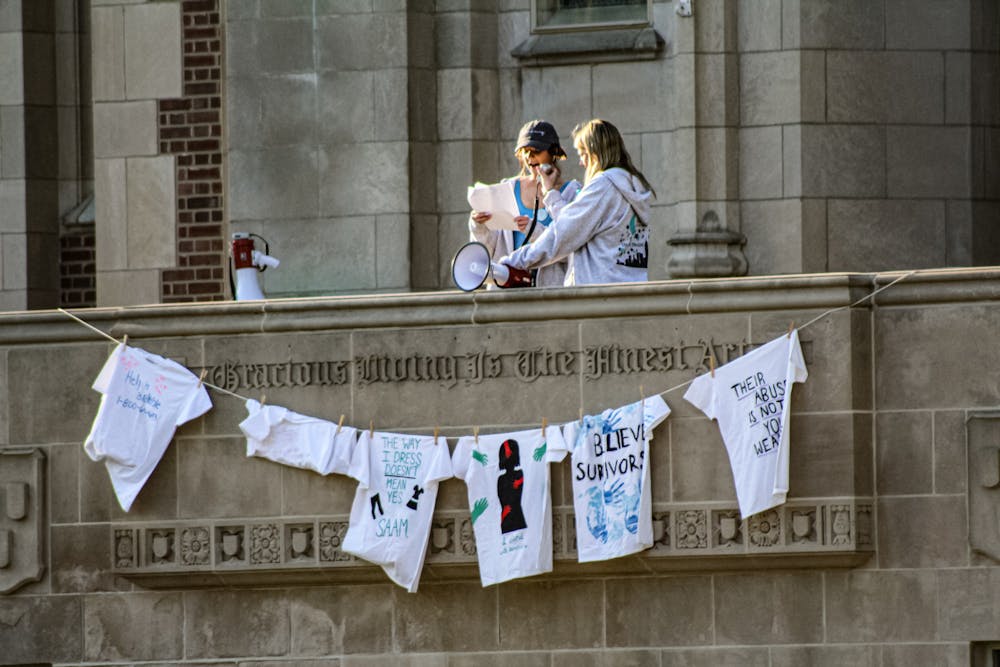
Alpha Chi Omega members and elementary education majors Maddie Lewis and Kayleigh Miller shared testimonies from anonymous survivors who experienced sexual violence.
Lewis, a second-year who serves the role of intellectual development in the sorority, saw the importance of speaking up for survivors not comfortable sharing their experiences to still have their stories heard.
She also saw the significance of the difference between describing people affected by sexual violence as a survivor not a victim, because Lewis views the latter term as someone who believes all hope is gone when it isn’t.
“I think survivors realized they got through it and are past it, and victims look down on themselves when it’s not their fault,” Lewis said.
Lewis also saw sharing people’s stories and leaving the survivor anonymous pushes them to share their own stories themselves, receiving a confidence booster to be more open and vulnerable.
“It’s a step for them to open up and not keep it in, and by people hearing their story and acknowledging that it happened to them can help people by knowing it wasn’t their fault and all these people are here to support them,” Lewis said.
Similarly, Miller, a third-year student and the vice president of new member education, enjoys “Take Back The Night” the most out of all the events her sorority puts on. She noted specifically the desire not to organize the event out of money, but genuine compassion for the survivors themselves.
“Since our philphantrophy is domestic violence awareness and sexual assault prevention, it’s just something near and dear to all of us,” Miller said. “It drew a lot of us in to join our sorority, so it’s just super special to be able to put this on for the rest of campus and see it’s not just special to us; it has impacted a lot of people, and we’re here to be that voice.”
Miller feels as though survivors fear people won’t believe them if they’re honest with their abuse, but sees comfort in the sense they’re not the only ones feeling this way and can therefore relate to other survivors through shared experiences.
Additionally, she noted the audience of participants for “Take The Night Back” mainly involve greek life and desires reaching out to other clubs and organizations for larger campus involvement, and providing additional awareness to sexual violence.
For those who wish to keep their stories private and remain anonymous, campus resources such as The Center For Survivor Support and The Ball State Counseling Center offer confidential support for survivors.
“Even if they aren’t ready to speak up about their story just yet, they have all these resources here on campus and all these people here that are here to support them,” Miller said.
Contact Zach Gonzalez with comments via email at zachary.gonzalez@bsu.edu or on Twitter @zachg25876998

